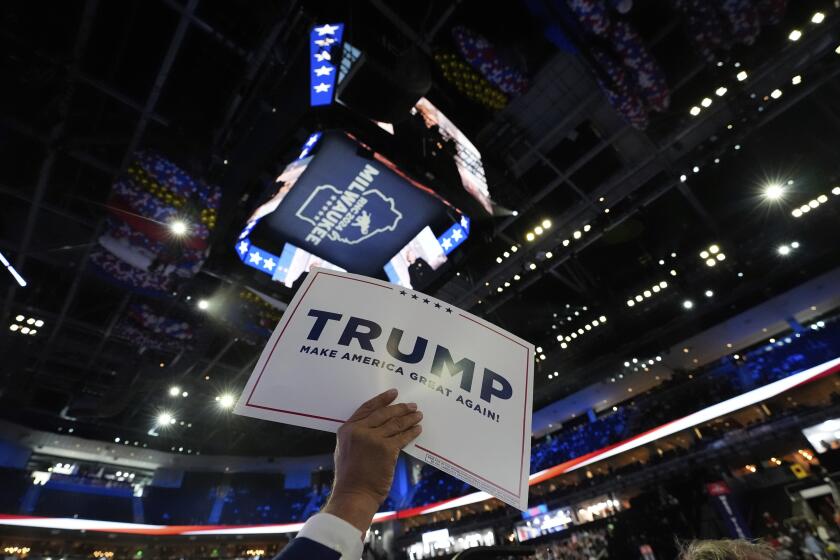Op-Ed: Journalists are at war with their critics — and they’re losing badly
Long before we knew who’d won Tuesday’s special election in Alabama, we knew who had lost: the media. At least, that is, according to conservative media critics.
“Roy Moore Proves Media Only Destroys Itself in Elections” ran a headline Monday in The American Spectator. “The late Charles Manson seems to have gotten a more sympathetic press” than Republican Roy Moore, complained former human events editor Allan H. Ryskind in the Washington Times. “The real reason for a situation that allows the Roy Moores and Donald Trumps of the world to rise above mere laughingstock status,” opined former George W. Bush speechwriter Matt Latimer in Politico, “is that the media has totally lost its connection with a large portion of the nation.”
The view from inside the belly of the mainstream beast couldn’t have been more diametrically opposed.
“ ‘The media’ is not on the ballot in Tuesday’s special election in Alabama,” CNN Reliable Sources anchor Brian Stelter wrote Monday. “That’s obvious, yes, but it bears repeating because Roy Moore has been trying to run against the national news media for the past month.”
The primary motivation for most watchdog-watchdogging is political.
How could the same problem look so different to two large sets of people? The answer explains a lot about how we consume and act on political information in 2017. It begins with the two main categories of media criticism: insider and outsider.
Outsider criticism generally comes in the form of correctives aimed at the largest news organizations that maintain a professional pretense of fairness — newspapers, wire services, network news broadcasts, some cable networks, news radio. While occasionally arising from a sincere desire to improve the overall quality of information (see Snopes.com), the primary motivation for most watchdog-watchdogging is political. And because only 7% of full-time American journalists self-identify as Republican (as of this widely cited 2014 study), the most energized outsider media critics of the moment are on the right.
All political media criticism — whether it was the more left-leaning alternative and New Journalism of the ’60s and ’70s, the right-leaning AM radio revolution of the ’80s and ’90s or the social media cacophony we see today — begins as a necessary and bracing reminder to the big media fish that they, too, swim in water, even if they don’t feel it.
But soon, the outsider critique brushes up against the first iron law of media criticism: Partisan skepticism inevitably drifts toward media illiteracy. What starts out as a tool for more sophisticated news consumption eventually degrades into an excuse for those who choose not to believe inconvenient journalism.
So we see headlines like The Federalist’s “It’s Media’s Fault 71 Percent Of Roy Moore Voters Don’t Believe WaPo Allegations,” and startling sentences like this one from the Wall Street Journal’s William McGurn: “They may well be wrong about Mr. Moore and his accusers, but is their skepticism really that difficult to understand?”
That’s not a corrective; that’s an apologia for ignorance and nihilism.
Insider media criticism, the kind practiced both by in-house media reporters such as Stelter and various ombudsmen and readers’ representatives, suffers from its own iron law: Industrial self-critique inevitably drifts toward pompous defensiveness.
After President Trump recently tweeted another sophomoric insult at CNN anchor Don Lemon, for example, the network opted for not a bemused stoicism but a condescending whine: “In a world where bullies torment kids on social media to devastating effect on a regular basis with insults and name-calling, it is sad to see our president engaging in the very same behavior himself. Leaders should lead by example.” Boo-frickity-hoo.
As the above illustrates, the two opposing views on media are self-reinforcing and increasingly dominate American politics. Anti-media fervor is arguably the strongest glue left holding together the Republican coalition, as evidenced by our troll president; his troll-Svengali, Breitbart editor Stephen K. Bannon; and the uber-troll, twice-defrocked Alabama jurist Roy Moore.
The legacy media and its left-of-center customer base, meanwhile, cannot resist taking the bait, leading to too much anti-Trump error and an off-putting haughtiness when caught out. Reliable Sources this weekend used the occasion of a bad CNN mistake — the network had reported that Trump and his son received a WikiLeaks web address and encryption key before they were made public, when in fact they got them after — to have several guests bemoan Trump’s attacks on the media, rather than, I don’t know, delve into exactly how CNN messed up.
The struggle against Trump’s norms-shattering presidency is real. So is the decreasing marginal utility of crying wolf at every opportunity. How to thread that needle? Another CNN anchor, Jake Tapper, pointed the way at the L.A. Press Clubs awards this year.
“We don’t need to give the enemies of the Fourth Estate any ammunition,” Tapper warned. “That means we need to be squeaky clean. We’re not the resistance. We’re not the opposition. We’re here to tell the truth, report the facts, regardless of whom those facts favor one way or the other.”
Matt Welch is editor at large of Reason, a magazine published by the libertarian Reason Foundation, and a contributing writer to Opinion.
Follow the Opinion section on Twitter @latimesopinion or Facebook
More to Read
A cure for the common opinion
Get thought-provoking perspectives with our weekly newsletter.
You may occasionally receive promotional content from the Los Angeles Times.






